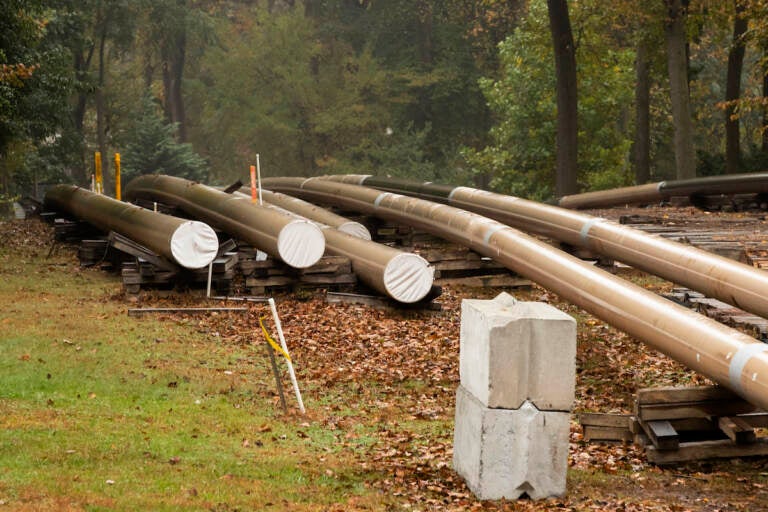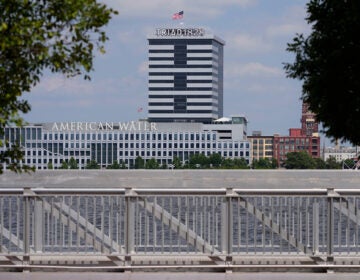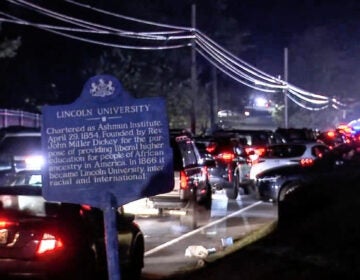Mariner East pipeline project is finished, after years of environmental damage, construction delays
Energy Transfer says it has completed the troubled 350-mile-long natural gas liquids pipeline, two years behind the initial schedule.

FILE - In this Oct. 22, 2019 file photo, pipes lay along a construction site on the Mariner East pipeline in a residential neighborhood in Exton, Pa. (AP Photo/Matt Rourke, File)
Pipeline builder Energy Transfer says it has finished the troubled 350-mile-long Mariner East natural gas liquids project — five years after construction began, two years after the initial planned completion date, and several months after the state Attorney General’s office filed 48 criminal charges against the Texas-based company. The bulk of the product will be shipped to Scotland to make plastics.
Pennsylvania’s Department of Environmental Protection issued new permits in December allowing construction on the section of the pipe that had been halted since August 2020, after the company spilled between 21,000 and 28,000 gallons of drilling mud fluid into Marsh Creek Lake. That Chester County section was one of the last parts of the line to be completed.
The end of pipeline construction means the focus will be on shipping more Marcellus and Utica Shale gas overseas — something welcomed by building trades looking to boost jobs at the export terminal in Marcus Hook, but dreaded by those living with an operating pipeline in their backyards.
“This is bad news,” said Ginny Marcille-Kerslake, a Chester County resident and organizer for Food and Water Watch. “Putting the … Mariner East 2 pipeline into operation means increased risk of a catastrophic explosion in densely populated communities in Southeastern Pennsylvania.”
Kerslake said there are no good emergency plans in the event of a leak. The pipes contain natural gas liquids (NGL) including ethane, butane and propane. They are not odorized, and are heavier than air. When a leak occurs, they sink and can easily ignite and explode. She said families are “put at unacceptable risk for this out-of-state corporation to profit from shipping fracked ethane overseas for more plastic junk. Relying on luck is not enough.”
In its recent fourth-quarter earnings call, Energy Transfer said that commissioning of the Mariner East lines will boost its overseas exports. Natural gas liquids through the Mariner East lines increased 10% in 2021 over the previous year. Overall, the company’s NGL exports doubled over the last two years.
That’s good news for Jim Snell, business manager for Steamfitters Local 420.
“This is the news our members have been waiting for,” said Snell. “They’ve been laboring for years on this pipeline because they know even greater opportunities are possible at the Marcus Hook Industrial Complex and beyond once everything is up and running. The economic benefits of this project have been irrefutable, but the economic promise is even greater.”
From the outset, the Mariner East project faced roadblocks after its initial permit applications to the Department of Environmental Protection were deemed deficient and challenged by environmental groups. Almost immediately after the construction began, it faced delays. The project has caused dozens of drilling mud spills into wetlands and waterways across the state, led to dangerous sinkholes in Chester County, and polluted drinking water supplies across the entire length of the project. The company purchased at least five homes in Chester County after its work damaged the aquifer and created sinkholes.
The DEP has issued more than 120 notices of violations to Energy Transfer, which has paid more than $20 million in fines and assessments since construction began in February 2017. The state Public Utility Commission temporarily shut down the operation of the Mariner East 1 pipeline in 2018 over safety concerns.
Residents and environmental groups say those fines did not deter the company from continuing to damage ecosystems and put neighbors at risk.
“The company benefited from a DEP that was only willing to fine them,” said Clean Air Council executive director Joe Minott. “ME pipeline should have had all their permits revoked and granted no new permits. You cannot fine rich corporations like that into compliance. It is a truly sad day for Pennsylvanians.”
Even the final leg of the pipeline met opposition. Local residents and politicians wanted construction halted, at least until the company completed a cleanup of Marsh Creek Lake.
State Sen. Katie Muth, a Democrat who represents parts of Chester and Montgomery counties, said she was “infuriated” by the new permits allowing construction at Marsh Creek and called for the testing of public and private wells along the entire route.
“No one has done that,” she said. “This project was flawed from the beginning.”
Oversight by DEP has drawn criticism by local politicians and residents.
Christina “PK” DiGiulio lives by Marsh Creek in Chester County and used drones to document construction.
“It’s been a reckless process,” she said. “This is the DEP enabling a criminal entity to push their pipe through without doing proper groundwater impact studies and protecting the health and safety of the people.”
Three controversial pipelines
The Mariner East project consists of three pipelines carrying highly volatile ethane, propane, and butane: the 8-inch Mariner East 1 line; the 20-inch Mariner East 2 line; and the 16-inch Mariner East 2x. The lines carry Marcellus Shale gas from western Pennsylvania to the company’s 800-acre terminal in Marcus Hook, Delaware County, where the bulk of the product is shipped to Scotland to make plastics.
The company now plans to convert part of the Mariner East 1 back to carrying refined products, such as gasoline, jet fuel, diesel, and heating oil. The “Pennsylvania Access” line would connect Midwest refineries to central Pennsylvania, the Lehigh Valley, and upstate New York.
Opposition to the Mariner East project has been particularly fierce in the densely packed suburbs of Philadelphia, where its foes say the pipes carrying highly volatile natural gas liquids pose a safety threat while not providing energy to Pennsylvania residents. And they say continuing to put fossil fuel infrastructure into service runs counter to global, national, and statewide goals on tackling climate change.
“This is one of the most reckless drillers in the nation,” said Muth. “No, the pipeline is not safe. It goes through neighborhoods, schools, nursing homes, libraries, places it should not be. And there is not a need for this pipeline in the commonwealth.”
Muth pointed to the explosion of Energy Transfer’s natural gas liquids Revolution pipeline in 2018 in rural Beaver County. After being in service for only a week, the pipeline ruptured during a landslide, engulfing a hillside in flames and forcing evacuations. The explosion released 3 million cubic feet of gas and sent flames 150 feet into the air. No one was injured in the blast, but it killed several pets, damaged vehicles, and destroyed six high-voltage electric transmission towers and an electrical line.
An Energy Transfer spokesperson has said the company operates its Mariner East pipelines safely.
“There are no safety concerns regarding the ongoing operations of our active pipelines in this area, which have safely operated for years,” said spokesperson Lisa Coleman.
Coleman said the natural gas liquids transported through the Mariner East lines and exported at the Marcus Hook terminal are “critical to our supply chain as the building blocks used to manufacture the products we use daily.”
WHYY is your source for fact-based, in-depth journalism and information. As a nonprofit organization, we rely on financial support from readers like you. Please give today.







